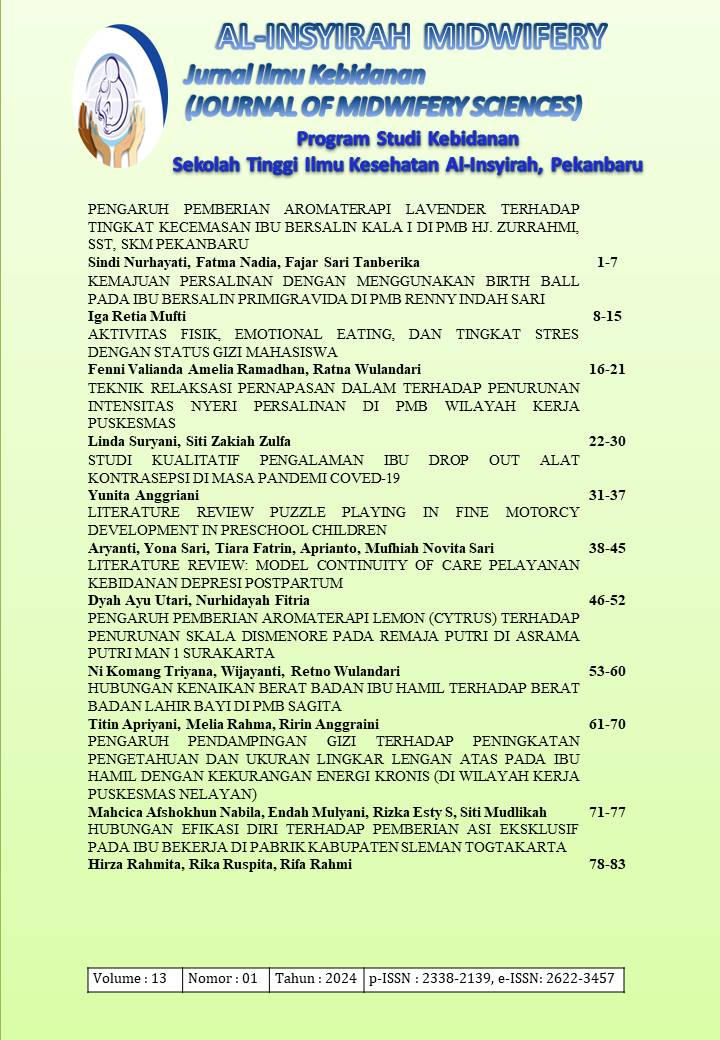HUBUNGAN EFIKASI DIRI TERHADAP PEMBERIAN ASI EKSKLUSIF PADA IBU BEKERJA DI PABRIK KABUPATEN SLEMAN YOGYAKARTA
DOI:
https://doi.org/10.35328/kebidanan.v13i1.2629Kata Kunci:
ASI Ekslusif, Efikasi Diri, Ibu BekerjaAbstrak
Pemberian ASI eksklusif dapat menurunkan angka kesakitan dan kematian bayi, mengurangi risiko penyakit kronis, dan membantu perkembangan bayi. Kembali bekerja merupakan salah satu alasan terbanyak ibu berhenti menyusui. Secara global, terdapat sekitar 51% perempuan yang terlibat dalam angkatan kerja, dibandingkan dengan laki-laki yakni sekitar 82%. Salah satu hambatan pemberian ASI Eksklusif pada ibu bekerja adalah keyakinan dirinya untuk memberikan ASI. Penelitian ini bertujuan untuk mengetahui hubungan efikasi diri dengan pemberian ASI eksklusif pada ibu bekerja di pabrik wilayah Kabupaten Sleman. Metode penelitian ini adalah kuantitatif survei analitik dengan pendekatan cross sectional. Pengambilan sampel menggunakan teknik purposive sampling dan didapatkan 75 sampel ibu pekerja pabrik yang memiliki bayi berusia 6-12 bulan. Instrumen penelitian menggunakan kuesioner The Breastfeeding Self-Efficacy Scale oleh Dennis (2003). Metode analisis data yang digunakan adalah analisis univariat, analisis bivariat dengan Chi Square Test. Hasil analisis bivariat diketahui efikasi diri memiliki p value 0,002 (OR 5,225 CI 1,871-14,593). Efikasi diri berhubungan dengan pemberian ASI eksklusif pada ibu yang bekerja di pabrik. Efikasi diri bisa ditingkatkan dengan pemahaman dan dukungan dari lingkungan ibu.
Unduhan
Referensi
Anstey, E. H., Coulter, Martha., Jevitt, Cecilia M., Perrin, Kay M., Dabrow, Sharon., Lynne B. Klasko-Foster., et al. (2018) ‘Lactation consultants’ perceived barriers to providing professional breastfeeding support’, J Hum Lact, 34(1), 51–67. doi: 10.1177/0890334417726305.
BPS (2016). Jumlah Penduduk yang Bekerja Menurut Sektor dan Jenis Kelamin per Kecamatan di Kabupaten Sleman Tahun 2016.
______(2019) Booklet Survei Angkatan Kerja Nasional Agustus 2019, BPS.
Cook, Erica Jane., Powell, Faye., Ali, Nasreen Ali., Jones, Catrin Penn., Ochieng, Bertha., Randawa, Gurch. (2021) ‘Improving support for breastfeeding mothers: a qualitative study on the experiences of breastfeeding among mothers who reside in a deprived and culturally diverse community’, Int J Equity Health. International Journal for Equity in Health, 20(1), 1–14. doi: 10.1186/s12939-021-01419-0.
Dennis, C. (2003) ‘The Breastfeeding Self-Efficacy Scale : Psychometric Assessment of the Short Form’. doi: 10.1177/0884217503258459.
Gebremariam, Kahsu. T. T., Zelenko, O., Hadush, Z., Mulugeta, A., Gallegos, D (2020) ‘Exploring the challenges and opportunities towards optimal breastfeeding in Ethiopia: A formative qualitative study’, International Breastfeeding Journal. 15(1), 1–10. doi: 10.1186/s13006-020-00265-0.
Gharaei, T., Amiri-Farahani, L., Haghani S., & Hasanpoor-Azghady, S. B. (2020). The effect of breastfeeding education with grandmothers’ attendance on breastfeeding self-efficacy and infant feeding pattern in Iranian primiparous women: a quasi-experimental pilot study. International breastfeeding journal, 15(1), 1-10.
Henshaw, E. J. Fried., Fried., Siskind., Newhouse.,Cooper (2015) ‘Breastfeeding self-efficacy, mood, and breastfeeding outcomes among primiparous women’, J Hum Lact, 31(3), 511–18. doi:
Jara-Palacios, M. Á., Cornejo, A. C., Peláez, G. A., Verdesoto, J., & Galvis, A. A. (2015). Prevalence and determinants of exclusive breastfeeding among adolescent mothers from Quito, Ecuador: a cross-sectional study. International Breastfeeding Journal, 10(1), 1-8. Kemenpppa (2018) Profil Perempuan Indonesia.
Mudaharimbi, E. P. (2021). Efikasi Diri Ibu Primigravida yang Bekerja dalam Keberhasilan Memberikan ASI. Jurnal Promkes: The Indonesian Journal of Health Promotion and Health Education, 9(1), 28-35.
Nursan, C., Dilek, K. and Sevin, A. (2014) ‘Breastfeeding self efficacy and affecting factors’, Aquichan, 14(3), 327–35. doi: 10.5294/aqui.2014.14.3.5.10.1177/0890334415579654.
Pounds, L., Fisher, C.M., Josiah, D. B., Coleman, J. D., Lefebvre., R. C. (2017) ‘The Role of Early Maternal Support in Balancing Full-Time Work and Infant Exclusive Breastfeeding: A Qualitative Study’, Breastfeed Med, 12(1), 33–38. doi: 10.1089/bfm.2016.0151.
Rashid, A. A., Shamsuddin, N. H., Malek Ridhuan, R. D. A. R., Sallahuddin, N. A., & Devaraj, N. K. (2018). Breastfeeding Practice, Support, and Self-Efficacy Among working Mothers in a Rural Health Clinic in Selangor. Malaysian Journal of Medicine & Health Sciences, 14(2).
Sun, K. Chen, M., Yin, Y., Wu, L., Gao, L. (2017) ‘Why Chinese mothers stop breastfeeding: Mothers’ self-reported reasons for stopping during the first six months’, J Child Health Care, 21(3), 353–63. doi: 10.1177/1367493517719160.
Sulaiman, Z., Liamputtong, P. and Amir, L. H. (2016) ‘The enablers and barriers to continue breast milk feeding in women returning to work’, J Adv Nurs, 72(4), 825–35. doi: 10.1111/jan.12884.
Thussanasupap, B., Lapvongwatana, P., Kalampakorn, S., & Spatz, D. L. (2016). Effects of the community-based breastfeeding promotion program for working mothers: A quasi-experimental tudy. Pacific Rim International Journal of Nursing Research, 20(3), 196-209.
Wahyuni, S. D., Santoso, B., Triharini, M., & Susan, N. (2020). Perceptions of Working Mothers Toward Breastfeeding Self-Efficacy. Jurnal Ners, 15(2)
World Health Organization (2016) ‘BREASTFEEDING COUNSELLING A TRAINING COURSE PARTICIPANTS ’ MANUAL PART ONE Sessions 1-9’, Training Manual, 1–171. Available at: https://www.who.int/maternal_child_adolescent/documents/pdfs/bc_participants_manual.pdf.
Zhu, J., Chan., Wai C.S., Zhou, X.,Ye, Benlan., He, Hong Gu (2014) ‘Predictors of breast feeding self-efficacy among Chinese mothers: A cross-sectional questionnaire survey’, Midwifery. Elsevier, 30(6), 705–11. doi: 10.1016/j.midw.2013.12.008.
Zilanawala, A. (2017) ‘Maternal Nonstandard Work Schedules and Breastfeeding Behaviors’, Matern Child Health J. Springer US, 21(6), 1308–17. doi: 10.1007/s10995-016-2233-4.
Unduhan
Diterbitkan
Terbitan
Bagian
Lisensi
Hak Cipta (c) 2024 Jurnal Ilmu Kebidanan

Artikel ini berlisensi Creative Commons Attribution 4.0 International License.













